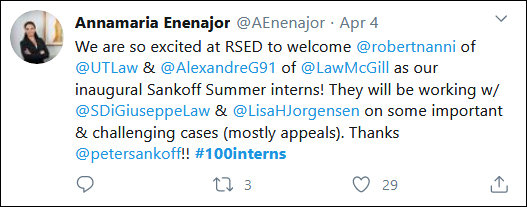The #100Interns project takes offAfter many law students across Canada lost their summer job prospects because of the COVID-19 crisis, University of Alberta criminal law professor and practitioner Peter Sankoff launched his #100Interns project in early April to help students find internships. He was inspired to this when he was flooded with applications for a position he’d opened up. His goal now is to place 100 interns with practitioners and academics working in criminal law, constitutional law, or animals & the law by the end of May, and collect funding for those internships. BCL/JD students Adrienne Tessier (2L) and Michael Aarenau (3L) were hired by criminal defence lawyer Neha Chugh, who practices in the Ottawa and Cornwall areas. In a tweet, Sankoff revealed that Chugh was planning on hiring only one student, but she found both applicants so impressive, she decided to take on both. Meanwhile, Annamaria Enenajor, BCL/LLB’12, and her partners at Ruby Shiller Enenajor DiGiuseppe, is fully funding two interns who will be supervised by lawyers at the firm, and one of their hires is BCL/JD student Alexandre Giroux (3L)!
27 April update: we just found out that Kerrin-lee Whyte (3L) has found work with Jonathan Rudin and Aboriginal Legal Services in Toronto as the project’s 62nd intern. 29 April update: Raphael Schmieder-Gropen (2L) will be working with the Public Interest Law Centre in Winnipeg, under the supervision of @AllisonFenske. 5 May update: Loic Welch-Mongeau (3L) will be working with @LucieJoncas of Desrosiers Joncas Nouraie Massicotte in Montreal, QC, while Alexandra Moser (2L) will intern with Eric Gottardi of Peck and Company in Vancouver, BC, making them the 83rd and 84th interns supported by the project. |
Governments can end homelessness during this pandemic — and keep it that way
 BCL/JD student Zoë Christmas, Ricochet, 15 April 2020
BCL/JD student Zoë Christmas, Ricochet, 15 April 2020
“If this global pandemic has shown us anything, it’s what’s most important to us. Some of us have been powering through self-isolation by making frequent calls to our loved ones. Others, fortunate to have solid internet connections, have been binge-watching shows or learning new skills from video tutorials. Others still have mobilized networks of mutual support, attending to our friends’ (or our own) job precarity and income loss.
But the most vital things in our lives — next to access to free, quality healthcare and perhaps reliable communications, such as phone, radio or the internet — have proven to be food and shelter. This crisis, which obliges us to stay “home,” has prompted a collective reminder of what constitute the bare essentials, staples that the most vulnerable of populations have only transient access to…” Read more…
COVID-19: Greater Police Powers Is Not the Solution
 BCL/JD student Souhila Baba, National Newswatch, 8 April 2020
BCL/JD student Souhila Baba, National Newswatch, 8 April 2020
“Stay home, or you might end up in jail. Across the country, provincial and local governments are granting increasing powers to police forces, in view of enforcing public health measures of social distancing and self-isolation. While these measures are in place to slow down the spread of COVID-19, relying on police to enforce them is cause for concern.
For the most part, people are respecting the measures urged by public health officials: stay home, keep a two-meters distance from others, do not gather in groups, wash your hands. But what happens when people defy the rules?” Keep reading…
USA’s Executive Order on Use of Space Resources: A critical perspective
DCL candidate Upasana Dasgupta, A Space Lawyer’s Perspective, 8 April 2020
In her blog, Upasana Dasgupta provides an analysis of the recent USA’s Executive Order on Use of Space Resources, which according to her is an unilateral act that violates the USA’s international obligations. Read her post…
BCL/JD student Alan Luo donates 10,000 masks to the MUHC Foundation
 In a post on LinkedIn in early April, BCL/JD student Alan Luo wrote: “Today, I exited my house for the first time in 17 days for something that was not just a solo walk in the park with my dog. On behalf of my family and another family who is close to us, I donated 10 000 facemasks* to the McGill University Health Centre Foundation in hopes of helping out the inspiring healthcare workers who are at the front of the line in our united fight against COVID-19.
In a post on LinkedIn in early April, BCL/JD student Alan Luo wrote: “Today, I exited my house for the first time in 17 days for something that was not just a solo walk in the park with my dog. On behalf of my family and another family who is close to us, I donated 10 000 facemasks* to the McGill University Health Centre Foundation in hopes of helping out the inspiring healthcare workers who are at the front of the line in our united fight against COVID-19.
I have also been in contact, alongside my mother, with other members of the Chinese community, to figure out how we could donate more of these essential products to workers who need them. Having seen the news, it breaks my heart to know that we are currently unable to keep up with the demand for essential equipment, which includes facemasks. […] In these trying times, I think it’s important to recenter our focus onto finding ways to help out hospitals and health care workers who are entering the rough of it as of this moment.”
* When asked about the source of the masks, Luo indicated: “We had them shipped directly from contacts in China who are licensed medical equipment producers! These masks were ordered after news reports that hospitals would face shortages and were used expressly to serve as relief equipment for hospitals here.”
McGill’s #LawNeedsFeminismBecause group releases 5th Annual Photo Campaign
24 March 2020
This year’s theme was Intersectionality. The photographer was Alexanne Brisson and the photo editor was Alexa Klein. Community partners consisted of Women of Colour Collective of McGill Law, OutLaw McGill 2019-2020, McGill Muslim Law Students’ Association, Contours, Indigenous Law Association / Association de Droit Autochtone, the McGill Mental Health and Wellness Committee.
View the 62 photos on Facebook…
What is the True Purpose of Quebec’s Bill 21?
LLM candidate Phil Lord, Directions Journal, March 2020
Student Phil Lord has a new article in the Canadian Race Relations Foundation’s Directions Journal, titled “What is the True Purpose of Quebec’s Bill 21?”, in which he explores two contrasting perspectives on Quebec’s secularism law, asks if Bill 21 a suitable method to achieve secularism, and examines is the social & historical context behind the bill. Read the article…
Opinion: For some people, home isn’t the safest place
 BCL/JD student Cassandra Richards, Montreal Gazette, 19 March 2020
BCL/JD student Cassandra Richards, Montreal Gazette, 19 March 2020
“As Canadians increasingly self-isolate amid urgent and necessary calls by the federal and provincial governments, many women and children will be at greater risk of facing domestic violence. In fact, for many, a greater threat to their health and safety might be in their very home.
Isolation works to the advantage of abusers, allowing them to exercise greater power and control over their victims. The National Domestic Violence Hotline in the United States explains that abusers may manipulate women and children by withholding food or sanitary products, or by spreading misinformation about the virus. While isolation alone will heighten violence, other consequences deriving from isolation will equally exacerbate it.” Keep reading…
CIAJ’s Judicial Internships across Canada: A McGill Student’s Experience alongside a Chief Justice
 BCL/JD student Michael Forestell, CIAJ-ICAJ Blog, 13 March 2020
BCL/JD student Michael Forestell, CIAJ-ICAJ Blog, 13 March 2020
“This past August brought me back to New Brunswick for a week at the Court of Appeal. After living in Montreal, Fredericton appeared even more bucolic than I remembered, especially in the late-summer tranquility before university students enliven the streets.
The timing of my visit was for less congenial reasons: Chief Justice Marc Richard decided to host a student to observe an exceptional summer hearing for a prominent murder case. A young woman was appealing her conviction as one of three murderers of a young man found tortured to death in the ruins of a fire-ravaged home. There was considerable evidence against the two other accused, but the Appellant’s conviction hinged on videotaped testimony by an alleged accomplice.” Keep reading…
Opinion: How the Trudeau government is failing the world’s most vulnerable despite its ‘feminist’ aid policy
 BCL/JD student Kassandra Neranjan (co-author), CBC News, 8 March 2020
BCL/JD student Kassandra Neranjan (co-author), CBC News, 8 March 2020
“On International Women’s Day, it’s critical to reflect upon the Canadian government’s failure to properly support some of the most marginalized people in our global society: stateless Rohingya women.
Since its launch in 2017, the Trudeau government has promoted its “Feminist International Assistance Policy,” aimed at supporting the economic, political, and social empowerment of women and girls. Yet despite providing aid funding, the government has displayed woefully inadequate action in the context of the Rohingya genocide and refugee crisis.” Keep reading…
Being convinced of suffering an injustice does not discharge your obligation as a self-representing litigant
BCL/JD student David Gelles (co-author), Blogue du CRL du Jeune Barreau de Montréal, 4 mars 2020
In response to the decision rendered in O’Connor v. Giancristofaro-Malobabic, 2018 QCCS 4099 (“Giancristofaro”), Mr. Werner Moosberger, a shareholder in MonRoi Inc., essentially asked the Superior Court to rule on four motions. In O’Connor c. Monroi Inc., 2019 QCCS 5320, Moosberger asked the Superior Court to: 1) quash the seizure of MonRoi’s patent; 2) rule on a claim for monetary compensation from Me. Daniel O’Connor; 3) revoke the judgment in Giancristofaro; and 4) appoint a different judge to rule on these motions. The judge dismissed all motions, finding that Moosberger did not have sufficient legal interest to seek these remedies, and further finding that there was no reasonable apprehension of bias on his part, towards Moosberger. Keep reading…
Sudan’s Omar al-Bashir may finally face justice for Darfur. But the work is not yet done
 BCL/JD student Mark Kersten, Justice in Conflict, 21 February 2020
BCL/JD student Mark Kersten, Justice in Conflict, 21 February 2020
“Former Sudanese dictator Omar al-Bashir may soon face trial before judges of the International Criminal Court. Take a moment. Read that again. Let it sink in.
The ICC shook the diplomatic world in 2009 when it issued a warrant for Mr. al-Bashir over the atrocities in Darfur, where a horrendous conflict had already cost the lives of thousands in what is widely acknowledged as a genocide. It marked the first time the court had indicted a sitting head of state.” Keep reading…

